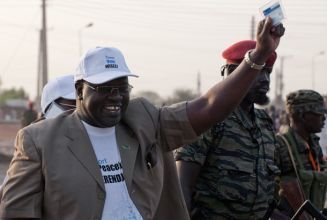South Sudan plans first-ever national reconciliation campaign
November 24, 2012 (JUBA) – The leadership of the 15-month old nation, South Sudan, has announced its plan to organise a first-ever comprehensive peace and national reconciliation conference to try and heal the mental wounds that have visibly divided some of the communities over the years.

President Salva Kiir Mayardit will address the leaders on this daunting task to forgo the past and focus on the future, which has been a challenging situation still facing the underdeveloped country 15 months after independence.
Vice President, Riek Machar Teny, on Saturday explained the prevalence of trauma which he said is still haunting leaders and communities in the country, locking them in mental wars in their minds.
In the first consultative preparatory meeting for the planned the conference on Saturday, which he chaired and involved relevant government institutions and international NGOs, the second powerful man in the new state expressed the burning need to address the trauma and divisions.
“South Sudan has gone through a violent past which has caused mental barriers with some still fighting wars in their minds,” he told the preparatory meeting in the Council of Ministers hall on Saturday, adding that “the country should reconcile with its own past.”
“People should accept the past even if not necessarily forgetting it and come to terms with it,” he further advised.
Political differences among politicians in South Sudan dating back to early 1980s and during the North-South war with its current neighbour Sudan have had played part in inter-communal conflicts particularly when such political differences were misunderstood and generated into tribal conflicts fitting some highly illiterate rural communities from which such political rivals hailed.
Machar in August last year became the first senior political leader to initiate the post-independence reconciliation process by voluntarily apologizing to the Dinka Bor community for his past political differences with the late founder of the SPLM/A, John Garang de Mabior, in a split in 1991, which also violently affected the neighbouring Bor-Dinka and Lou-Nuer communities in particular and the wider Dinka and Nuer communities in general.
Machar and Mabior reconciled their political differences in January 2002 in the Kenyan capital, Nairobi, and collectively pledged to work towards achieving peace in Sudan and exercising the right to self-determination by the people of South Sudan and Abyei.
However some of their respective supporters including senior intellectuals seem to have continued holding on to the past differences and investing on recalling the events.
Machar made the apology on behalf of his group in the presence of Dinka Bor intellectuals in the house of late John Garang’s widow, Madam Rebecca Nyandeng de Mabior, in Juba where he was invited by the family to commemorate with them the life of the late leader and colleague.
The apology was however received with mixed reactions from the two communities during which others from the Nuer community, for instance, asked for a reciprocal apology from the Dinka senior political leaders with countered demands from the Dinka community who wanted the apology be made in the land of Dinka Bor community; a demand which Machar met during his later visit to the Dinka Bor areas this year.
Another major bitter past which is also fresh in memories of many intellectuals and communities included the inter-communal division which occurred in early 1980s, commonly known as the Kokora, resulting from political differences between former Presidents of the then Southern Sudan’s High Executive Council, Abel Alier and Joseph Lagu.
The situation, which was the first major politically motivated inter-communal conflict in the region, fitted communities of Greater Equatoria region against non Equatorians, particularly the Dinka and the Nuer. The storm of such division has not completely settled and can well be explained in the current difficulty faced in the acquisition of land in the national capital, Juba.
The preparatory meeting on Saturday also identified other causes of inter-communal conflicts which are beyond political differences such as land acquisition in the urban setups across the region.
Issues of good governance such as accountability and transparency and war on corruption will also be addressed during the reconciliation campaigns, Machar explained, adding that they also generate feeling of injustice and discontent between communities.
He appealed to the international bodies and organizations to support the government-led initiative in order to bring peace and harmony among the communities in South Sudan.
The presidential advisor on decentralization and head of the organizing committee for the conference, Tor Deng Mawien, in a press statement after the meeting expressed the importance of the initiative, urging for the nation to move forward and forget the past differences.
He further explained that the conference will also be addressed by a number of high profile international personalities including the famous South African Archbishop, Desmond Tutu.
The long reconciliation campaign will also target the army and all the other organized forces as well as university students, he added.
(ST)
